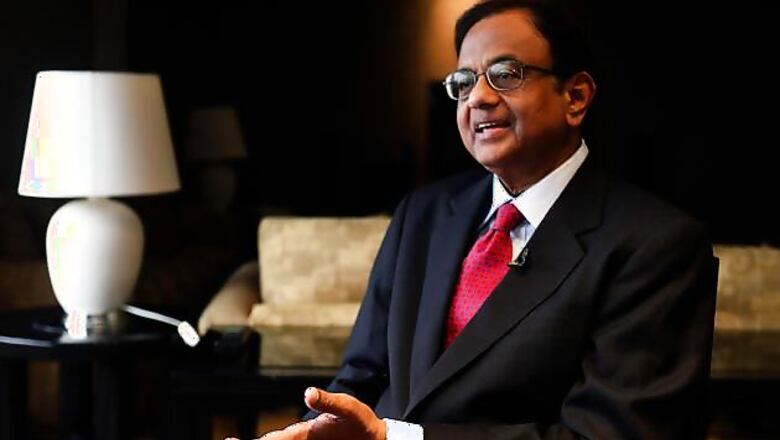
views
New Delhi: Except for carmakers who were hit by a surprise tax, industry leaders largely cheered Finance Minister P Chidambaram's Union Budget 2013-14 and termed it as "people's budget", "balanced" and "strong". "Finance Minister did the best he could. He revised the bad decisions of previous budget restoring hope for people," former Infosys director Mohandas Pai said.
Industry welcomed the government's emphasis on inviting more foreign investment in infrastructure and other sectors. "The key to restart the growth engine is to attract more investment, both from domestic investors and foreign investors. Investment is an act of faith," Chidambaram said in his Budget speech in Parliament on Thursday.
"The most reassuring aspect of the budget today is the Finance Minister's acknowledgement of the criticality of continued inflow of foreign investments for augmenting the country's growth. The focus is clearly on the imperative of maintaining a healthy environment to mobilise it," said Deepak Kapoor, Chairman, PwC India.
Chidambaram, who presented his 8th and India's 82nd budget, said more focus will be put on removing apprehensions from the mind of the investors, "including fears about undue regulatory burden or application of tax laws. Doing business in India must be seen as easy, friendly and mutually beneficial".
Chidambaram had also emphasised on a need of greater investment in the infrastructure sector. "The Finance Minister has also done well to place continued emphasis on the infrastructure sector, particularly, social infrastructure, which is really the need of the hour." Kapoor added.
Meanwhile, Rajat Jain, Managing Director, Xerox India said, "The announcement of a GST law that will be drafted by the State Finance Ministers & the GST Council and allocation of a sum of Rs 9,000 crore towards the first installment of the balance of CST compensation for States is a welcome step towards much awaited fiscal consolidation. Further, the 15 per cent tax allowance for investments over Rs 100 crore is amongst some of the important measures announced for promoting investment in the country."
"Overall, there is the much needed focus on infrastructure growth. The stress on education continues unabated, with the Rs 65000 crore allocation, and the continued focus on inclusive growth is heartening. Reassurances around the innovative direct cash transfer scheme and allocation of Rs 80,194 crore in 2013-14 for Ministry of Rural Development, along with measures to promote skill development amongst youth bode well. Significant steps have also been announced to promote innovation and talent development - promising a holistic march towards the FMs vision of becoming a much stronger economic power by the end of this decade," said the Xerox India Managing Director.
"The budget was austere in character and as expected stressed on fiscal prudence. What should please us in corporate India is the fact that the FM has laid a lot of importance on two specific areas which are imperative to boost growth- namely infrastructure development and Medium and Small enterprises," said Pradeep Nair, Managing Director, India and SAARC Autodesk. "Overall, not much that's spectacular or game changing in the budget, but well balanced."
However, markets were less optimistic and shares tanked during and after Chidambaram's highly anticipated Budget speech. The BSE Sensex lost 290 points to close at 18,861, and the Nifty fell 103 points to end the day at 5693. Pai, former Infosys director, said positive effects of this fiscal year's budget can only be felt in 2014-15.
"The budget has invited a mix reaction from the real estate sector. There is a bit of disappointment as the sector was expecting an industry status with the announcement of the budget this year which did not happen. Though it is a neutral budget, the issues pertaining to real estate sector have not been addressed in as much detail as infrastructure," said Pushpa Bector, Senior Vice President, Leasing and Mall Head, DLF Mall of India.
While other cheered, carmakers in the country felt the heat with the budget for the coming financial year proposing a hike in the duty paid by the manufacturers of the vehicles to 30 per cent from 27 per cent. The Budget also failed to include a reduction in excise on small cars, as the industry had hoped.
"Given the growth in that sector, that's going to hit very hard," Lowell Paddock, managing director of General Motors' Indian operations. "It's going to affect a lot of different manufacturers here ... I was surprised by that. What I guess I find frustrating is that there was not a recognition that the industry is currently in the doldrums," Paddock said, adding that the specific details of the SUV duty hike would be important in determining its impact.
Shares in Mahindra and Mahindra Ltd, India's biggest SUV manufacturer, fell as much as 2.5 percent on Thursday, and shares in Tata Motors Ltd fell as much as 2 percent. Maruti Suzuki India Ltd, India's biggest carmaker, saw its shares fall as much as 3.4 percent, and the BSE auto index shed as much as 1.3 percent after the announcement.
Meanwhile, even as the annual budget brought cheers to Agro-based companies, the edible oil extraction industry expressed disappointed over their issue of import duty structured anomalies on crude and refined palm oil not being addressed. "Total withdrawal of export duty on de-oiled rice bran oil cake will help the industry, as such a duty had made our exports uncompetitive. Non inclusion of agro commodities for the CTT (commodity transaction tax) on commodities trading again will help the sector," Ruchi Soya Industries Managing Director Dinesh Shahra said.
Investment allowance at the rate of 15 per cent in plant and machinery made after April 1 will also boost the industry. Low cost of financing and generation-based incentives will encourage investments in renewable energy projects, Shahra said.
"Implementation of goods and services tax (GST) is a welcome move and I am sure, it will be backed by immediate concrete steps. All in all, the Finance Minister seems to have achieved a balancing act of fiscal prudence with emphasis on both growth and stability. We were expecting the Finance Minister to raise import duty on crude palm oil to 10 per cent and refined palmolein to 20 per cent thus maintaining a healthy differential of 10 per cent that could have benefited farmers of India and the domestic refining industry," he added.
(With Additional Inputs From Reuters and PTI)


















Comments
0 comment